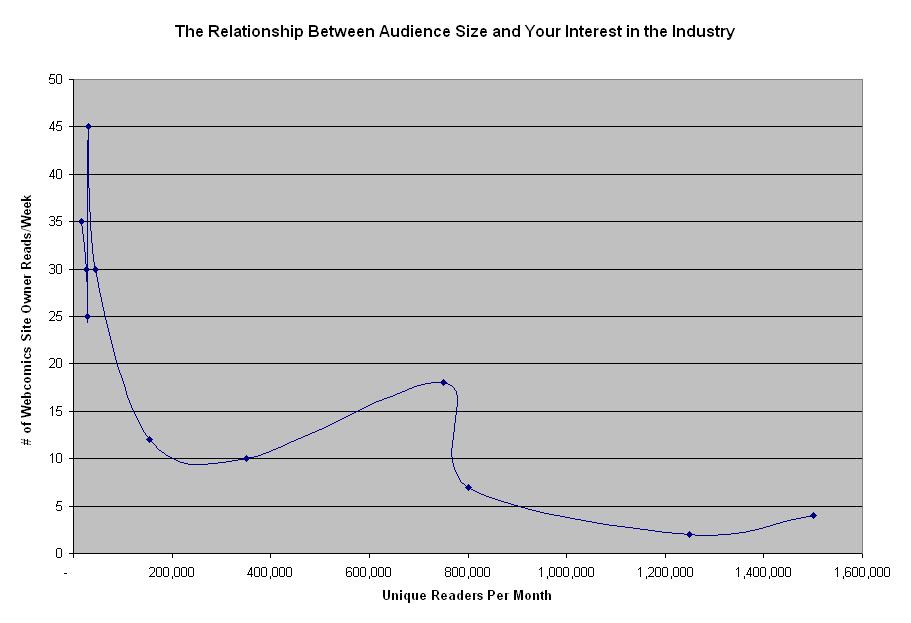A large component of Web 2.0 is user generated content and leveraging that material with some sort of revenue model. Digg, YouTube, Myspace… we all use them on a day-to-day basis, so their relevance is undeniable. But is this really a new concept? Webcomic artists have been doing this for nearly a decade, with the only difference being the "platform" wasn't some mega-site, but rather this thing called the Internet. Give yourself a pat on the back, because you've been ahead of the curve, creating digital content for the throngs of viewers/readers/listeners out there… but for what? Why do you do what you do?
Someone will set themselves on fire for the camera and upload it to YouTube. 200,000 views! 10 awards! 6 Favorites! Some other guy has 12,000 friends on Myspace – another metric of success! Being the most "connected" person in my firm, my colleagues will ask, "Sebs, why do these guys do this crap? They're giving it away for free, so it's obviously not for money." Well maybe it is and maybe it isn't. Creators may think of the promised land of some producer discovering them on the Internet to give them that big movie/TV/recording deal they've always dreamed of. I've been giving it some thought, and my hyper-scientific models (possibly misguided intuition) have determined less than 5% of user generated content is created with the purpose of "striking it rich."
Which brings us back to the world of Webcomics. It's user generated content. The majority of you aren't living off the proceeds, so you're pretty much giving it away for free. The question is, why? Assuming the same attitudes as other Web 2.0 categories apply, do only 5% of you do it for the possibility of fortune? Maybe you do it as a creative outlet? Perhaps you treat it as one would a Flickr account?
Or maybe… you do it for fame. Fame to your friends. Fame within your peer group. Fame within the community.
Before I delve into that, I want to share with you some pseudo-research I did last year. Over the past five months, whenever I would speak with a webcomic artist about something, I would ask an additional two questions: How big is your monthly audience and how many different webcomics do you read each week? I was pretty surprised at my findings:

It turns out the more successful you are, the more you don't really care about other Webcomics (assuming the number of webcomics you read in a week is correlated with how much you "care"). I will be the first to admit my sample size of 11 artists doesn't really qualify as statistically significant, but there is something to be said for the downward trend regardless.
So the bottom 80% represented in the graph — why are you doing this? Why aren't you focusing more on getting readers instead of browsing through the archives of your competitor? Well, I don't think you see them as competitors for one. It seems to me you've started to create webcomics to be "famous" in this incredibly insular community (of which 99% read Comixpedia). Getting a small audience from this community is easy, and in my opinion, it's why you do it. It's your "15 minutes of fame," only in Webcomics, you are much less famous than the original saying intended and for a much longer period of time.
Big Picture
Although this discussion is micro in nature and may even seem trivial, it has significant macro implications. Barriers to entry to this small "industry" are extremely low, and in fact are in sync to how easy it is to be a voice in the space. There's still quite a bit of drama and discussion about each other (note the bottom 80% incestually reading each other) with few members taking real action in the outside world. What this says to me is that despite being around for ten years, the medium is still in its infancy.
I predict there will be some major changes in the next five that will likely do away with the motivations of the bottom 80%, carving the top 50% into three different success tiers. As opposed to infighting and talking about personalities and drama, the leaders will be mulling over technologies, platforms and integration. I see slivers of these discussions on Comixpedia now, but they're generally drowned out by the "who can write a longer response" contests that dominate the threads today.
In some ways I wish I wrote this article first to introduce the business advice, but I really didn't really have a true grasp of what the community was like until then. Yes, it's healthy to look at the internal strengths and weaknesses of you, your brand and your company, but don't forget about growth externally. Consider looking at not just your competitors but those that have different types of products, different methods of distribution and different ways of making money. Think of the key learnings from those industries you can apply to yours. There's a lot to learn out there, but you have to stop looking in the mirror before you realize those possibilities.
Good luck everyone.
"I predict there will be some major changes in the next five that will likely do away with the motivations of the bottom 80%, carving the top 50% into three different success tiers."
The reasoning behind that prediction is not terribly clear. It appears to ultimately rest on this statement:
"It seems to me you’ve started to create webcomics to be "famous" in this incredibly insular community (of which 99% read Comixpedia)."
In turn, this statement appears to combine an illegitimate generalization, a WAG about others’ internal motivations and a colonic statistic. Therefore, I don’t respect the resulting prediction.
_________
My avatar is from Erfworld by Rob Balder & Jamie Noguchi.